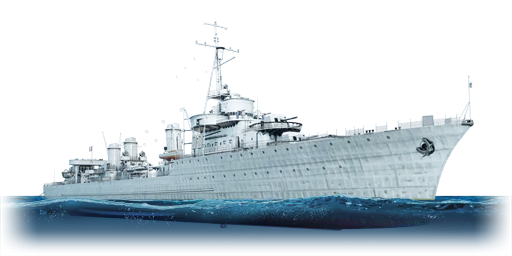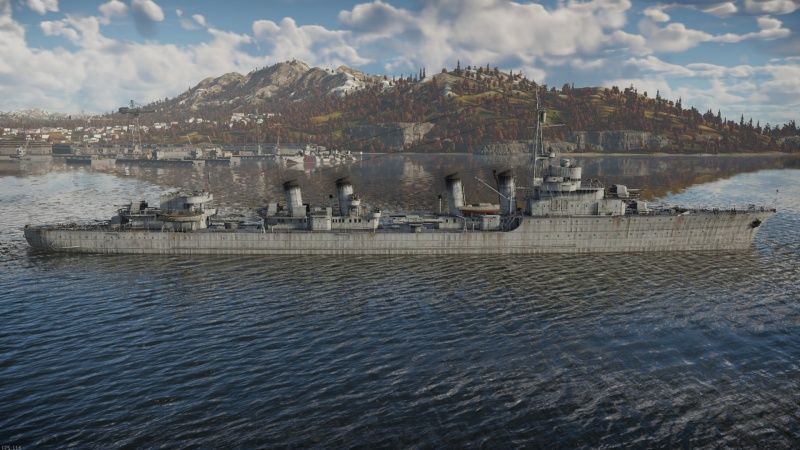Difference between revisions of "Vauquelin"
(→Description) |
Colok76286 (talk | contribs) (Edits) |
||
| Line 53: | Line 53: | ||
{{Specs-Fleet-Additional}} | {{Specs-Fleet-Additional}} | ||
<!-- ''Describe the available additional armaments of the ship: depth charges, mines, torpedoes. Talk about their positions, available ammunition and launch features such as dead zones of torpedoes. If there is no additional armament, remove this section.'' --> | <!-- ''Describe the available additional armaments of the ship: depth charges, mines, torpedoes. Talk about their positions, available ammunition and launch features such as dead zones of torpedoes. If there is no additional armament, remove this section.'' --> | ||
| − | {{main|B4M mine|Guiraud depth charge|Model 1923DT (550 mm)}} | + | {{main|B4M mine|Guiraud 100kg depth charge|Model 1923DT (550 mm)}} |
''Describe the available additional armaments of the ship: depth charges, mines, torpedoes. Talk about their positions, available ammunition and launch features such as dead zones of torpedoes. If there is no additional armament, remove this section.'' | ''Describe the available additional armaments of the ship: depth charges, mines, torpedoes. Talk about their positions, available ammunition and launch features such as dead zones of torpedoes. If there is no additional armament, remove this section.'' | ||
Latest revision as of 17:26, 1 November 2024
Contents
Description
The Vauquelin was a lead ship of her class, laid down in March 1930 and launched on 29 September 1932. During her trials, she damaged her propeller and struck a rock, delaying the introduction to service. In 1934, she made her first trans-Atlantic trip to Canada. With the beginning of World War Two, she was assigned to Force X and escorted allied convoys on the Atlantic and Mediterranean, being based in Toulon. With the fall of France, Vauquelin was assigned to the Vichy French High Sea Forces, with her first notable mission being successful transport of the 138.6 mm ammunition to Beirut, where she was bombed on 22nd of June 1940 by Bristol Blenheim bombers, which scored 6 bomb hits on the vessel killing 5 men, but without any significant damage to the vessel. A week later she sailed for Lebanon, but failing to reach the destination undetected, she turned for Thessaloniki and eventually returned to Toulon. With the Case Anton, German military occupation of Vichy France, French sailors scuttled Vauquelin along with the rest of the French fleet at Toulon on 27 November 1942. Her burnt out wreck was scrapped after the war.
Vauquelin is a French destroyer introduced in Update "Air Superiority". In gameplay terms, she's very comparable to the destroyers of Aigle-class, with the most notable difference being added mines at the expense of significantly worse anti-air weaponry. On her own, she's a very fast destroyer with a very good broadside, excellent torpedoes and a decent survivability, at the expense of a very slow turret traverse and lower rate of fire, making her prone to ambushes, especially by coastal vessels, and difficult to operate in narrow straits between the islands, where ability to quickly change targets is of the essence.
General info
Survivability and armour
Talk about the vehicle's armour. Note the most well-defended and most vulnerable zones, e.g. the ammo magazine. Evaluate the composition of components and assemblies responsible for movement and manoeuvrability. Evaluate the survivability of the primary and secondary armaments separately. Don't forget to mention the size of the crew, which plays an important role in fleet mechanics. Save tips on preserving survivability for the "Usage in battles" section. If necessary, use a graphical template to show the most well-protected or most vulnerable points in the armour.
Mobility
Write about the ship's mobility. Evaluate its power and manoeuvrability, rudder rerouting speed, stopping speed at full tilt, with its maximum forward and reverse speed.
| Mobility Characteristics | |||
|---|---|---|---|
| Game Mode | Upgrade Status | Maximum Speed (km/h) | |
| Forward | Reverse | ||
| AB | |||
| Upgraded | 90 | 31 | |
| RB/SB | |||
| Upgraded | 74 | 25 | |
Modifications and economy
Armament
Primary armament
Provide information about the characteristics of the primary armament. Evaluate their efficacy in battle based on their reload speed, ballistics and the capacity of their shells. Add a link to the main article about the weapon: {{main|Weapon name (calibre)}}. Broadly describe the ammunition available for the primary armament, and provide recommendations on how to use it and which ammunition to choose.
| Penetration statistics | |||||||
|---|---|---|---|---|---|---|---|
| Ammunition | Type of warhead |
Penetration @ 0° Angle of Attack (mm) | |||||
| 1,000 m | 2,500 m | 5,000 m | 7,500 m | 10,000 m | 15,000 m | ||
| OEA Mle 1928 | HE | 36 | 36 | 36 | 36 | 36 | 36 |
| OPFA Mle 1924 | SAPBC | 63 | 55 | 44 | 36 | 31 | 30 |
| Shell details | ||||||||||||
|---|---|---|---|---|---|---|---|---|---|---|---|---|
| Ammunition | Type of warhead |
Velocity (m/s) |
Projectile mass (kg) |
Fuse delay (s) |
Fuse sensitivity (mm) |
Explosive mass (TNT equivalent) (kg) |
Ricochet | |||||
| 0% | 50% | 100% | ||||||||||
| OEA Mle 1928 | HE | 700 | 40.2 | 0 | 0.1 | 3.41 | 79° | 80° | 81° | |||
| OPFA Mle 1924 | SAPBC | 700 | 39.9 | 0.05 | 6 | 2.53 | 48° | 63° | 71° | |||
Secondary armament
Some ships are fitted with weapons of various calibres. Secondary armaments are defined as weapons chosen with the control Select secondary weapon. Evaluate the secondary armaments and give advice on how to use them. Describe the ammunition available for the secondary armament. Provide recommendations on how to use them and which ammunition to choose. Remember that any anti-air armament, even heavy calibre weapons, belong in the next section. If there is no secondary armament, remove this section.
| Penetration statistics | |||||||
|---|---|---|---|---|---|---|---|
| Ammunition | Type of warhead |
Penetration @ 0° Angle of Attack (mm) | |||||
| 10 m | 100 m | 500 m | 1,000 m | 1,500 m | 2,000 m | ||
| OEA Mle 1925 | HE | 3 | 3 | 3 | 3 | 3 | 3 |
| Shell details | ||||||||||||
|---|---|---|---|---|---|---|---|---|---|---|---|---|
| Ammunition | Type of warhead |
Velocity (m/s) |
Projectile mass (kg) |
Fuse delay (m) |
Fuse sensitivity (mm) |
Explosive mass (TNT equivalent) (g) |
Ricochet | |||||
| 0% | 50% | 100% | ||||||||||
| OEA Mle 1925 | HE | 810 | 0.73 | 0 | 0.1 | 50 | 79° | 80° | 81° | |||
Anti-aircraft armament
An important part of the ship's armament responsible for air defence. Anti-aircraft armament is defined by the weapon chosen with the control Select anti-aircraft weapons. Talk about the ship's anti-air cannons and machine guns, the number of guns and their positions, their effective range, and about their overall effectiveness – including against surface targets. If there are no anti-aircraft armaments, remove this section.
Additional armament
Describe the available additional armaments of the ship: depth charges, mines, torpedoes. Talk about their positions, available ammunition and launch features such as dead zones of torpedoes. If there is no additional armament, remove this section.
Usage in battles
Describe the technique of using this ship, the characteristics of her use in a team and tips on strategy. Abstain from writing an entire guide – don't try to provide a single point of view, but give the reader food for thought. Talk about the most dangerous opponents for this vehicle and provide recommendations on fighting them. If necessary, note the specifics of playing with this vehicle in various modes (AB, RB, SB).
Pros and cons
Summarise and briefly evaluate the vehicle in terms of its characteristics and combat effectiveness. Mark its pros and cons in the bulleted list. Try not to use more than 6 points for each of the characteristics. Avoid using categorical definitions such as "bad", "good" and the like - use substitutions with softer forms such as "inadequate" and "effective".
Pros:
Cons:
History
Describe the history of the creation and combat usage of the ship in more detail than in the introduction. If the historical reference turns out to be too long, take it to a separate article, taking a link to the article about the ship and adding a block "/History" (example: https://wiki.warthunder.com/(Ship-name)/History) and add a link to it here using the main template. Be sure to reference text and sources by using <ref></ref>, as well as adding them at the end of the article with <references />. This section may also include the ship's dev blog entry (if applicable) and the in-game encyclopedia description (under === In-game description ===, also if applicable).
Media
Excellent additions to the article would be video guides, screenshots from the game, and photos.
See also
Links to articles on the War Thunder Wiki that you think will be useful for the reader, for example:
- reference to the series of the ship;
- links to approximate analogues of other nations and research trees.
External links
- [Wikipedia] French destroyer Vauquelin (1931)
- [Navypedia] VAUQUELIN destroyers (1933 - 1934)
- [uboat.net] FR Vauquelin - Large destroyer of the Vauquelin class
- French Destroyers: Torpilleurs D'escadre and Contre-Torpilleurs, 1922-1956 by John Jordan and Jean Moulin
| Ateliers et Chantiers de France (ACF) | |
|---|---|
| Destroyers | |
| Bourrasque-class | Bourrasque |
| Aigle-class | Aigle |
| Vauquelin-class | Vauquelin |
| Le Fantasque-class | Le Triomphant |
| France destroyers | |
|---|---|
| Bourrasque-class | Bourrasque · Tornade |
| Chacal-class | Chacal · Leopard · Panthere |
| Aigle-class | Aigle · Vautour · Milan |
| Vauquelin-class | Vauquelin |
| Le Fantasque-class | Le Malin · Le Triomphant |
| Mogador-class | Mogador |
| Hunt-class | La Combattante |
| Trophies | Germany |
| Desaix-class¹ | Kleber |
| Type 1936 | Marceau |
| Italy | |
| Chateaurenault-class² | Guichen |
| Modified: ¹Type 1934A-class destroyers · ²Capitani Romani-class cruisers | |





